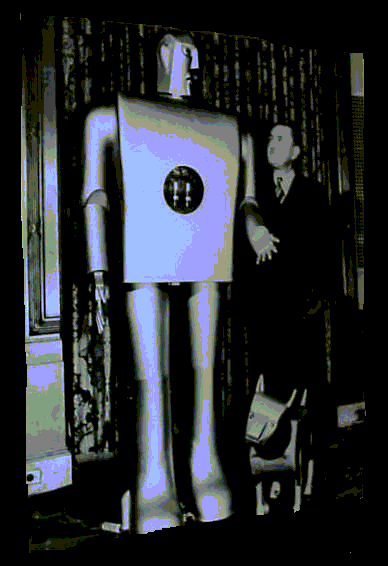
The word "robot" was coined by a Czeck playwright, Karel Capek, in the early 1920's. He wrote a play called "R.U.R.: Rossums's Universal Robots." In it he used the word robot which he adapted from the Czeck word for work. The play was an ordinary Sci-Fi opus in which the mad scientist invents artificial people, robots, lacking only souls, to do the world's work. The robots rebel, but the good guys win. The play died but the word lived on and is now the same in all languages
.

Science fiction also lived on and there have been innumerable similar scripts for books and plays and movies. Even the ballet, Coppelia, is about a robot girl with whom the living hero falls in love; Pinocchio is a living wooden boy.
Another literary robot was the monster created by imaginary Dr. Frankenstein who was created by real Mary Shelley. The good doctor modestly re-assembled existing human parts instead of starting from scratch.
Most people dislike doing most work and find a variety of ways to avoid it. Some simply shirk; others engineer machines to do it for them.
The earliest solution to the problem was to force somebody else to do the work. The practice was called slavery and it was used all over the world. There were a variety of rules dealing with ethnic origin, capture in conquest, people imprisoned for crime (mostly political), and the like. It worked pretty well for the slave owners and still does in some corners of the world. Hitler and Stalin were the most recent large scale European practitioners. It is largely out of fashion at present and, in the United States at least, laws against peonage tend to limit equivalent practices.
Some slave language lives on in the language of smart machines: MASTER, SLAVE, COMMAND, OBEY, SERVOMECHANISM, SERVO.
Slavery fell out of favor in the western world in the 19th century and was replaced by hiring people for pay, in money and keep. This practice is called employment and is now used all over the world. A variety of rules vary from only a legalistic distinction from slavery to a very favorable treatment indeed of the hired person. If the hired person does domestic work he or she is, or was, called a servant and if the hired person works in a business he or she is called an employee.
There are several objections to getting work done by employees. Human workers are not always energetic, reliable, docile, smart, and easily led. They are not always cheap, and those with the desired skills are not always available.
| [ Select and Purchase one of Mr. Kamm's Books] |
Click on number to jump to page.